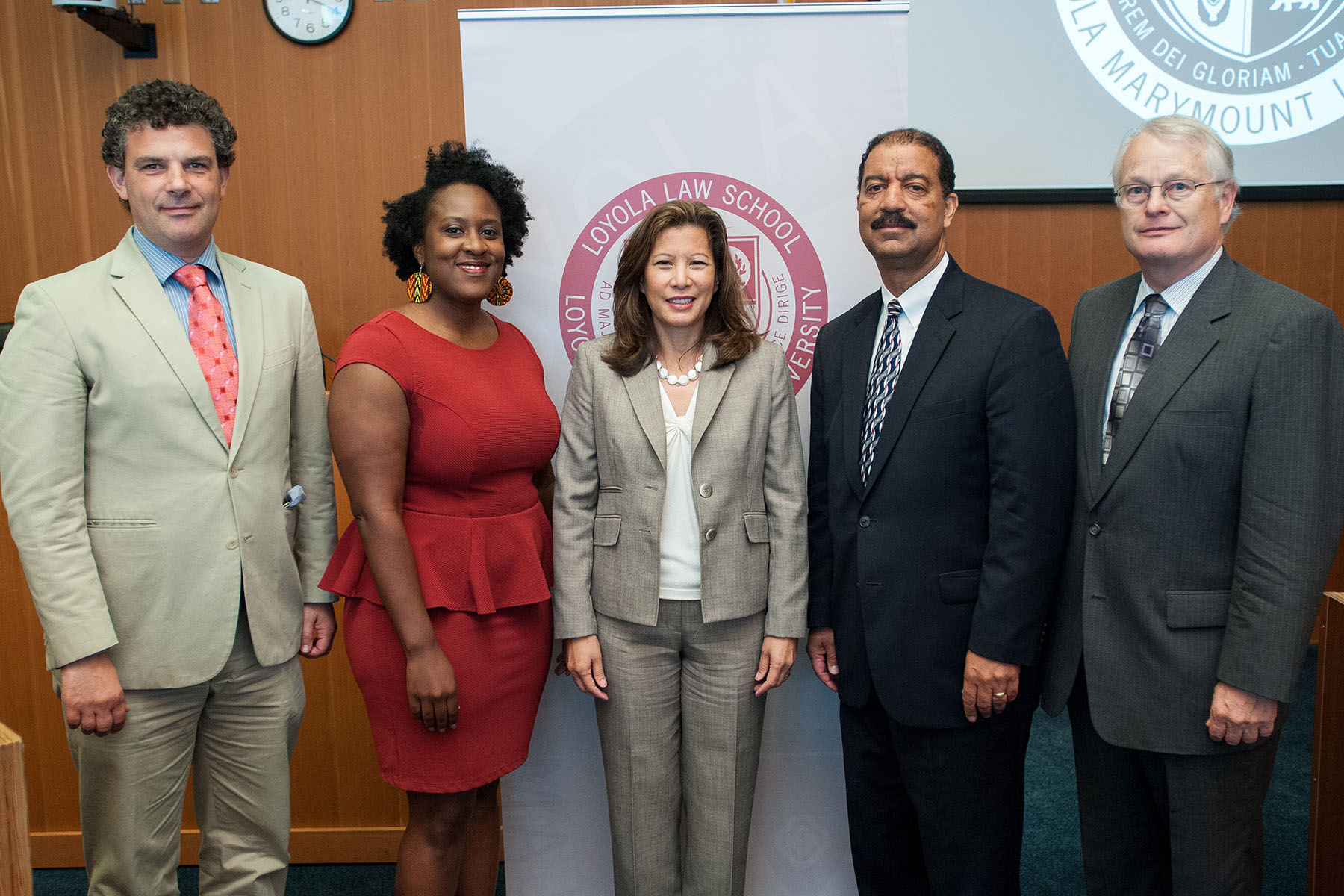Centers Foster Legal Discourse

Loyola Law School's centers focus on scholarship, symposia and other work in key subject areas. Their events bring to campus a constant flow of jurists, academics and other notables, making Loyola a West Coast hub for legal discourse. Loyola's centers foster the Law School's mission of educating the whole lawyer, providing a range of perspectives on myriad topics to help students and faculty share their ideas.
-
The Alarcón Advocacy Center includes the Loyola Project for the Innocent, Federal Public Defender Capital Habeas Clinic and the Ninth Circuit Appellate Clinic.
Before being nominated to the federal bench by President Jimmy Carter in 1979, Judge Alarcón was a judge on the Los Angeles Superior Court and California Court of Appeal. He was previously the legal advisor and clemency and extradition secretary to Gov. Edmund G. “Pat” Brown. He also served as a Los Angeles County prosecutor, working on first degree murder cases in which the death penalty was sought. He is the author of the recent law review article, “Executing the Will of the Voters?: A Roadmap to Mend or End the California Legislature's Multi-Billion-Dollar Death Penalty Debacle.”
"Who needs my help today?" That's the question the late Senior Ninth Circuit Judge Arthur L. Alarcón urged students to ask. Thanks to a series of post-conviction clinics that are part of his namesake center, Judge Alarcón's question is being asked by dozens of Loyola students on a daily basis.
-
The Loyola Law School Center for Juvenile Law and Policy was created with the hope of fostering systemic reform of the Los Angeles Juvenile Justice system through ongoing research, discussion and advocacy. The CJLP was founded on the principle that research, public education and advocacy are vital to accomplishing the following long-term objectives:
- Improve the quality of juvenile delinquency representation;
- Reduce minority over-representation in the juvenile justice system;
- Decrease the rate at which children are prosecuted as adults;
- Re-direct the juvenile justice system to its original purpose of individualized, community-based rehabilitation.
-
In 2008, Loyola Law School inaugurated the Center for the Study of Law and Genocide (CSLG). The year marked the 60th anniversary of the adoption of the 1948 Convention on the Prevention and Punishment of the Crime of Genocide. Despite two generations having passed since the seminal treaty, and all the progress made in international and domestic law towards preventing and punishing genocide and mass atrocities, the nightmare still persists without an apparent end. The history of genocide is a bloody trail running the whole length of the 20th century and linking the Armenian genocide, the Holocaust and Sudan to name an unfortunate few. In recent years, humanity has found the courage to bring to justice some of those most responsible for genocide and mass atrocities. But rarely, and with great difficulty, do victims find adequate legal remedies and compensation for their suffering.
-
Loyola Law School created the Civil Justice Program to focus research and public attention on the civil justice system. As a technologically advanced, teaching and research institution located in the most diverse city in the world, Loyola is ideally situated to sponsor this program. The Civil Justice Program convenes periodic conferences, seminars and presentations; promotes and publishes scholarly research; and initiates cross disciplinary projects.
-
The Coelho Center for Disability Law, Policy and Innovation is an interdisciplinary center that will convene top thought leaders in disability law and policy; generate and disseminate knowledge at the intersection of disability, technology, and innovation; and be a focal point for increasing the pipeline of talented students with disabilities in law, politics, and other fields of endeavor. We will be a leader on these issues in California, the United States, and internationally. The Coelho Center will bring together all of the schools and colleges within Loyola Marymount University, and will be housed at Loyola Law School.
-
Rooted in the Law School’s values and tradition of social justice, academic freedom, personal integrity and professional ethics, since 2012 the overarching mission of the International Human Rights Center at Loyola Law School, Los Angeles (“IHRC” or “Center”) is to contribute to the attainment of the fullest exercise of human rights by all human beings throughout the world. In carrying out this mission, the IHRC aims to maximize the use of global and regional legal and political institutions through litigation, advocacy and capacity-building.
-
The Loyola Center For Conflict Resolution (LCCR) provides mediation, conflict resolution training, and conciliation and facilitation services to communities throughout Los Angeles County (particularly those adjacent to the Law School). It also servers students, faculty and staff at Loyola.
-
The Loyola Public Service Institute (LPSI) addresses what it means to be a lawyer and a public servant in a dynamic ever-changing world. The institute encourages law students to pursue careers in public service by providing mentorship opportunities, externships and jobs.